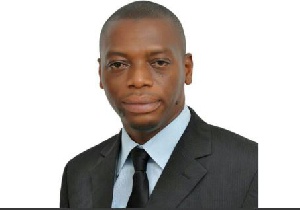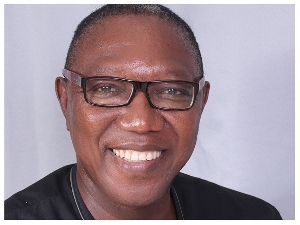 Executive Secretary of NAB, Dr Kingsley Nyarko
Executive Secretary of NAB, Dr Kingsley Nyarko
The National Accreditation Board (NAB) has instituted measures to review and audit the qualifications of lecturers in private accredited universities nationwide by the end of December 2020.
It would also develop ranking classification and rating systems for Tertiary Education Institutions (TEIs) and programmes by the end of December 2022 and review tutorial colleges accreditation modalities and instruments by the end of December 2020.
Executive Secretary of NAB, Dr Kingsley Nyarko made this known on Tuesday when the Board launched its “2019/2023 Strategic Plan” in Accra.
The Board also used the platform to commission an “Information Resource Centre” to enable staff of the Board and stakeholders to conduct researches on quality assurance and accreditation areas within the educational system.
Dr Nyarko said the vision of the Board as stipulated in the plan was to “guarantee a world-class quality higher education,” while its mission was to “provide the best basis for establishing, measuring and improving quality in tertiary education through accreditation, quality assurance and determining equivalences of qualifications.”
He said to achieve the vision and mission, the Board crafted six key strategic thrusts in response to the identified challenges and threats to enhance quality assurance frameworks and instruments to promote international standards and best practices.
He said thrust was also to develop credential evaluation frameworks and instruments to promote recognition of qualifications and credit transfers.
Dr Nyarko said there was the need for the Board to improve institutional support, visibility and legal frameworks for improved service delivery and compliance and strengthen Information and Communication Technology infrastructure and facilities to enhance usability.
He said the fifth and sixth thrusts for the Board was to develop and retain high calibre and committed staff that are innovative and globally competitive and as well improve revenue generation and enforce fiscal discipline to achieve operational and financial sustainability.
To keep pace in a dynamic global education environment and meet the demands of stakeholders, Dr Nyarko said the Board needed to maintain and enhance its financial strength.
He, therefore, appealed for support from government to grow the revenue of the Board from existing and alternative sources including global funding, manage its expenses and implement mechanisms to ensure that the Board got value for money and that expenditure was aligned with its strategic objectives.
The Education Minister, Mathew Opoku-Prempeh, said even though there was an Educational Strategic Plan for 2015 to 2030, the development of a new one in the midst of changes in the Ghanaian educational system, was laudable and necessary to enable the country to meet the Sustainable Development Goals.
The Minister gave an assurance that the new strategic plan, would not compromise future educational plans by government, but would rather; strengthened the various reforms set by the Ministry to provide robust education for Ghana to compete globally.
He said it was important for the Board to have a communication framework, coupled with digitisation of activities, processes and procedures.
Dr Opoku-Prempeh said he was optimistic that the strategic plan would enhance the effective execution of duties in the educational system.
Professor Kwame Boasiako Omane-Antwi, the Vice-Rector of the Pentecost University College, and a member of NAB, advised the Board to be abreast with changes in the educational system to be able to effectively execute its mandate.
He pledged the Board’s preparedness to institute appropriate guidelines and regulations to deal with emerging problems in tertiary education institutions.












